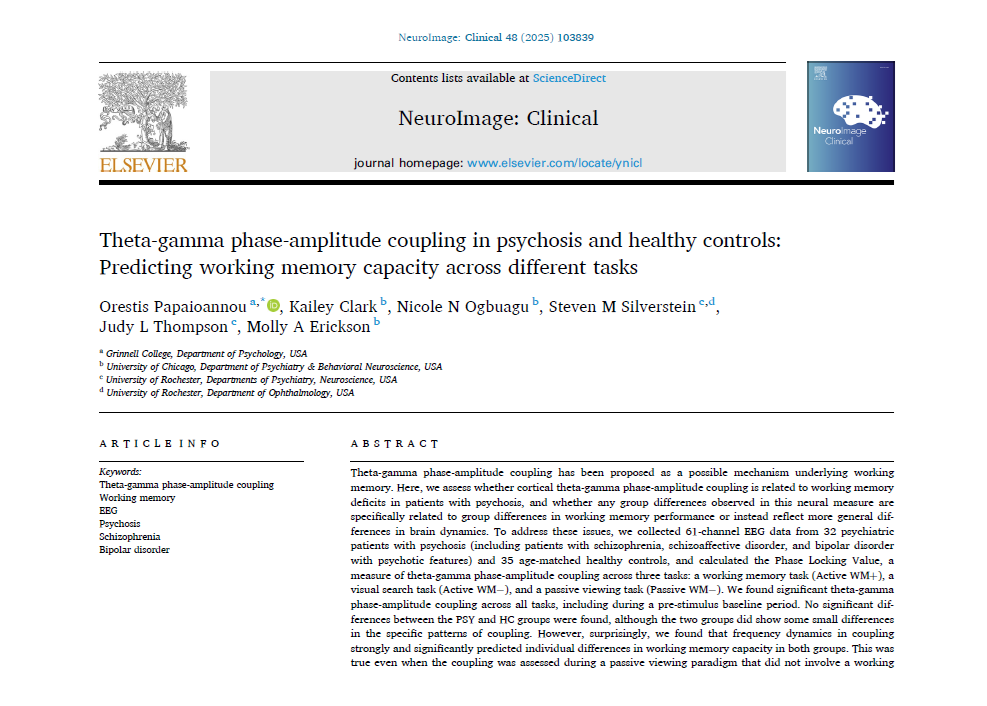Memory and Perception in Schizophrenia Laboratory
Molly A. Erickson, Ph.D. Principal Investigator Assistant Professor Department of Psychiatry & Behavioral Neuroscience The University of Chicago (773) 702-5855 merickson1@uchicago.edu Curriculum Vitae
Welcome to the MAPS Lab
At the Memory and Perception in Schizophrenia (MAPS) Laboratory, we are interested in understanding the neural mechanisms that give rise to sensory and low-level cognitive impairment in people with schizophrenia, with a larger aim to understand how these abnormalities impact cognitive domains that are important for functional outcome and overall quality of life. In pursuit of these aims, our program of research involves the use of electroencephalography (EEG) and behavioral testing paradigms to understand the neural and psychological processes associated with visual attention and working memory impairment in this patient population.
✨ Now Hiring ✨
We are currently hiring for multiple positions within the lab!
Postdoctoral Scholar: Dr. Erickson is currently accepting applications for a postdoctoral scholar to work on an NIMH-funded study of EEG markers of attention and working memory deficits in people with serious mental illness. Competitive applicants will have expertise in schizophrenia and/or electrophysiology. To apply, please send CV and cover letter to Dr. Erickson at merickson1@uchicago.edu with the subject line “Postdoctoral Position.”
Lab Coordinator: We are currently accepting applications for a full-time lab coordinator. This is intended to be a long-term position for someone who is interested in a research management career (i.e., not ideal for individuals who wish to apply to graduate school in the near future). Previous experience in project management strongly preferred. To apply, please send CV and cover letter to Dr. Erickson at merickson1@uchicago.edu with the subject line “Lab Coordinator Position.”
Other Opportunities
The MAPS Lab is always looking for study volunteers! We are specifically recruiting individuals between the ages of 18-60 who have been diagnosed with schizophrenia, bipolar disorder, or major depressive disorder. We are also recruiting individuals with no history of mental illness. Most studies require 3-4 visits lasting 2-3 hours per session, and we compensate at a rate of $20/hour. Any transportation costs are covered.
Click below to complete a brief survey, at which point a staff member will contact you to follow up with some additional questions and more information about the study. You may also call or text the lab to speak directly with a staff member at 773-242-9235.
Participate in a Research Study
Become a Student Research Assistant
The MAPS Lab is proud to feature an Undergraduate Research Assistant Program, which provides opportunities for University of Chicago students wishing to gain research experience. Interested students may apply for one of two tracks: (1) the clinical track, in which training is focused on developing proficiency in clinical interviewing, or (2) the EEG track, in which training is focused on learning EEG data collection and analysis.
In both tracks, students should expect to assist with many administrative aspects of running a research laboratory and participate in weekly journal clubs as schedules permit. Click below for more information about this opportunity!
Recent News
-

New paper! 🚨
Cognitive Neuropsychiatry
Nonclinical voice hearers (NCVH) exhibit heightened resistance to the depth inversion illusion, similar to people with schizophrenia. This work supports the notion that illusion resistance can serve as a marker for positive symptoms of schizophrenia rather than a generalized marker of illness severity.
-

New paper! 🚨
Biological Psychiatry: CNNI
Abnormal belief formation during Kamin Blocking Task is associated with a sense of unreality in people with schizophrenia (PSZ) and people with elevated esoteric beliefs (EEB).
-

New paper! 🚨
NeuroImage: Clinical
Theta-gamma phase-amplitude coupling is associated with overall working memory capacity in both healthy control subjects and in people with psychosis. Contrary to expectations, however, coupling was not abnormally reduced in the group with psychosis.






